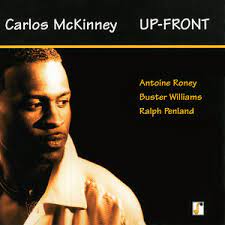
Daily Dose Of Jazz…
Ralph Morris Penland was born on February 15, 1953 in Cincinnati, Ohio. While in high school he was a percussionist with the Cincinnati Symphony Orchestra. He attended the New England Conservatory of Music and played in Boston, Massachusetts with Gil Scott-Heron and Webster Lewis.
In New York City in the early 1970s he played with Freddie Hubbard among others. By 1975 he was in Los Angeles, California and led his own group, Penland Polygon; he also worked as a session musician for Chet Baker, Kenny Burrell, Eddie Harris, Harold Land, Charles Lloyd, Ronnie Matthews, and Nancy Wilson.
In the 1980s he worked with George Cables, Dianne Reeves, Buddy Montgomery, Charlie Rouse, Jimmie Rowles, Rick Zunigar, Andy Simpkins, Dave Mackay, Bunky Green, Richard Todd, and John Nagourney. In the 1990s he toured with Frank Sinatra, Herbie Hancock, and Carlos Santana.
Ralph was active as a studio drummer, recording with Bob Cooper, Eddie Daniels, James Leary, Marc Copland, Dieter Ilg, Lou Levy, Carmen Bradford, Janis Siegel, Fred Hersch, Rickey Woodard, Carmen Lundy, Joe Sample, and Miki Coltrane.
Drummer and percussionist Ralph Penland, who over the course of his career recorded on fifty-six albums across a wide genre of music, died from a heart attack on March 13, 2014.
More Posts: drums,history,instrumental,jazz,music,percussion
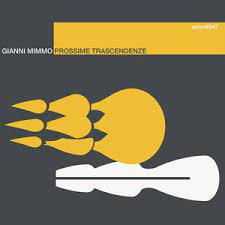
Daily Dose Of Jazz…
Gianni Mimmo was born on February 13, 1957 in Pavia, Italy. He developed a unique blend of abstract lyricism and contemporary flavours and has built an international reputation for his unique treatment of musical timbre and his exploration of the advanced techniques on the soprano saxophone. His peculiar work is mainly focused on the relationship among distant artistic declinations and his style is based on a deep knowledge of the instrument and on a sound consciousness which is the constitutional element of his voice.
As composer he often works with graphic scores where elements coming from different musical languages find a new form where fragments and more unbound ideas ask for a fresher interpretation and performing responsibility.
His pantheon is pretty crowded and includes several names coming from art, music and philosophy: painters like Jackson Pollock, John McLaughlin, Toti Scialoja, Mario Sironi, Felice Casorati; adventurous jazz musicians like Steve Lacy, Roscoe Mitchell, contemporary souls like John Cage, Robert Ashely, Earle Brown, philosophers and beautiful minds like Giorgio Agamben and John Berger, writers like Yasunari Kawabata and Herman Melville, poets like Marina Cvetaeva and Wisława Szymborska.
He has numerous current projects and extensively tours in Europe and USA invited by international festivals and venues. In addition, he runs the indie label Amirani Records. Saxophonist and composer Gianni Mimmo continues to perform, compose and record.
More Posts: bandleader,composer,history,instrumental,jazz,music,saxophone
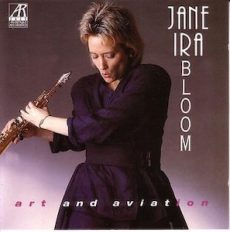
Daily Dose Of Jazz…
Ron Horton was born on February 12, 1960 in Bethesda, Maryland and attended Berklee College of Music from 1978 to 1980. He moved to New York City two years later where, as a longtime member of Jane Ira Bloom’s band (1983-2000), he became an integral part of the jazz scene.
Since 1992 Ron has been a member of the New York Jazz Composers Collective and the Herbie Nichols Project under Frank Kimbrough and Ben Allison. From 1998 to 2003 he was also a member of Andrew Hill’s sextet, and appeared on his album Dusk (1999).
Horton worked as a sideman with Ted Nash, Allan Chase, Bill Mays, Jon Gordon, Andy Laster, Phillip Johnston, Matt Wilson, Roberta Piket, Rez Abbasi, Walter Thompson, Pete Malinverni, Jamie Baum, Bill Gerhardt, Rich Rosenzweig, John McKenna, Michael Jefry Stevens, Peggy Stern and others.
He has given master classes and workshops at The New School in New York, the New England Conservatory of Music, the University of North Carolina, and Oxford University.
Trumpeter Ron Horton, who released his debut album as a leader in 1999, continues to perform and record.
More Posts: bandleader,educAATOR,history,instrumental,jazz,music,trumpet
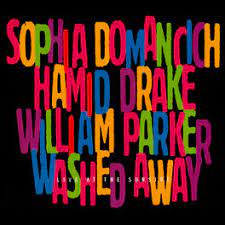
Daily Dose Of Jazz…
Sophia Domancich was born January 25, 1957 in Paris, France and began learning piano at the age of six. She attended the Conservatoire de Paris from 1968 to 1975 where she won first prize for piano and chamber music. She began her career as an accompanist in vocal and dance lessons, with the Paris Opera and the Théâtre de Caen.
In 1979 she met Steve Lacy, Bernard Lubat and Jean-Louis Chautemps who introduced her to the world of jazz and improvisation. By 1982 she formed a duet with Laurent Cugny and joined the big band Lumiére. She later participated in Quoi D’Neuf Docteur? with Steve Grossman, Glenn Ferris and Jack Walrath.
The following year during a brief collaboration with the group Anaïd, she met several English musicians from the Canterbury scene, drummer Pip Pyle, saxophonist Elton Dean and bassist Hugh Hopper, forming the group L’Equip Out in late 1984. The group included for a time a fifth member, Didier Malherbe on the flute and the tenor saxophone. In 1990, L’Equip Out recorded a second album, Up!, with bassist Paul Rogers.
With the latter and drummers Bruno Tocanne and Tony Levin, she formed the Sophia Domancich Trio with which she toured for eight years and recorded five studio albums. Also with Rogers, she created a 1995 quartet with the original composition, this time with two trumpeters, Patrick Fabert and Jean-François Canape.
Through the 1990s and into the new century, Domancich continued collaborating and recording with John Greaves and Vincent Courtois’ Trouble with Happiness, and with Simon Goubert. She was a pianist under Didier Levallet in the Orchester National de Jazz. In 2000 she formed the Quintet Pentacle, in 2006 the Trio DAG (Domancich, Avenel, Goubert) creating three albums as a trio and an album “free 4 DAG” with saxophonist Dave Liebman. Sophia ventured into electronic music, formed three more groups to continue to express herself through her music.
She became the first woman to receive the Prix Django Reinhardt from the Jazz Academy as French Musician of the Year. By 2007 found herself included in the French Ministry of Foreign Affairs and the Ministry of Culture collaborative book, 100 Jazz Titles, that included her 2002 Pentacle Quintet release.
She has recorded 10 albums as a leader, 7 as a co-leader and 20 as a member of other groups. Pianist and jazz composer Sophia Domancich continues to compose, explore, perform and reinvent herslf.
More Posts: bandleader,composer,history,instrumental,jazz,music,piano
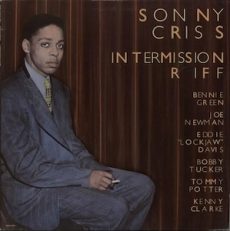
Requisites
Intermission Riff ~ Sonny Criss | By Eddie Carter
In 1951, producer Norman Granz, the founder of several jazz labels and the chief architect behind the Jazz at The Philharmonic concerts, began a tour featuring Billy Eckstine at the Shrine Auditorium in Los Angeles, California. During the intermission, an all-star septet led by alto saxophonist William “Sonny” Criss took the stage. The result of their performance is this morning’s album from the library, Intermission Riff (Pablo Records 2310-929), released in 1988 after archivist Eric Miller discovered the tapes. His bandmates are Joe Newman on trumpet, Bennie Green on trombone, Eddie “Lockjaw” Davis on tenor sax, Bobby Tucker on piano, Tommy Potter on bass and Kenny Clarke on drums. My copy is the original U.S. Mono release.
Intermission Riff by Ray Wetzel and Michael H. Goldsen opens the set. Eddie begins with a robust introduction before the ensemble’s lively melody. “Lockjaw” gets busy first in the opening solo. Joe motors along in the next spirited statement, and then Sonny follows with an electrifying reading that receives a huge ovation from the audience at its climax. Green provides an exclamation point with an exhilarating solo into a thrilling ending. How High The Moon by Nancy Hamilton and Morgan Lewis starts with the trio’s calypso introduction preceding the high-spirited theme. Newman starts things off, and then Davis is remarkably assured on the next solo. Potter gives an impressive reading next. Green excels on the following reading, and Criss cooks with passionate enthusiasm on the closer.
A rocking version of Perdido by Juan Tizol, Ervin Drake and Hans Lengsfelder starts with the septet’s vigorous melody. Criss makes a strong impression on the first solo. Newman shows assurance and confidence in the second reading. Tucker takes over with an energetic performance, followed by Davis’ unrestrained enthusiasm. Green enters the next solo with a vengeance, then Clarke closes with a brisk workout into the reprise and ending. Body and Soul by Johnny Green, Edward Heyman, Robert Sour and Frank Eyton begins with Green’s soothing introduction before the pace moves to mid-tempo for the ensemble’s melody. Newman, Tucker, Criss, and Davis all contribute concise readings that are expressed very well.
High Jump by E. Greene culminates the set in a blowing session as fast as the Road Runner after the septet’s joyous exuberance in the melody. Bennie speaks his piece first with the added horsepower of the front line in one chorus. Sonny meets the challenge on the second statement, and then Newman gives an aggressive reading that dares the rhythm section to keep up with him. Davis infuses his solo with a few bars of Wild Blue Yonder while exchanging a few thoughts with Kenny, who responds in explosive form preceding the closing chorus. George Horn initially mastered Intermission Riff and it was digitally remixed by Danny Kopelson. The album’s sound quality does have a few momentary sound dropouts, but Eric Miller thought the music was too important to be edited, so he didn’t remove them.
Intermission Riff gives a glimpse of Sonny Criss, who possessed a beautiful sound that was capable of creating emotional solos. He had much to offer the jazz world, as demonstrated on his albums for Imperial, Impulse, Muse Peacock, Prestige and Xanadu. In 1977, he was diagnosed with stomach cancer, and on November 19 of that year, at age fifty, he took his own life as a result of the constant pain. Whether you’re just discovering his music or are already familiar with his discography, I offer for your consideration on your next record shopping trip, Intermission Riff. It’s a remarkable live performance by
Sonny Criss that swings with the best of them and is recommended for a spot in any jazz library!
~ Body and Soul, How High The Moon, Perdido – Source: JazzStandards.com ~ Sonny Criss – Source: Wikipedia.org © 2024 by Edward Thomas Carter
More Posts: choice,classic,collectible,collector,history,instrumental,jazz,music,saxophone




